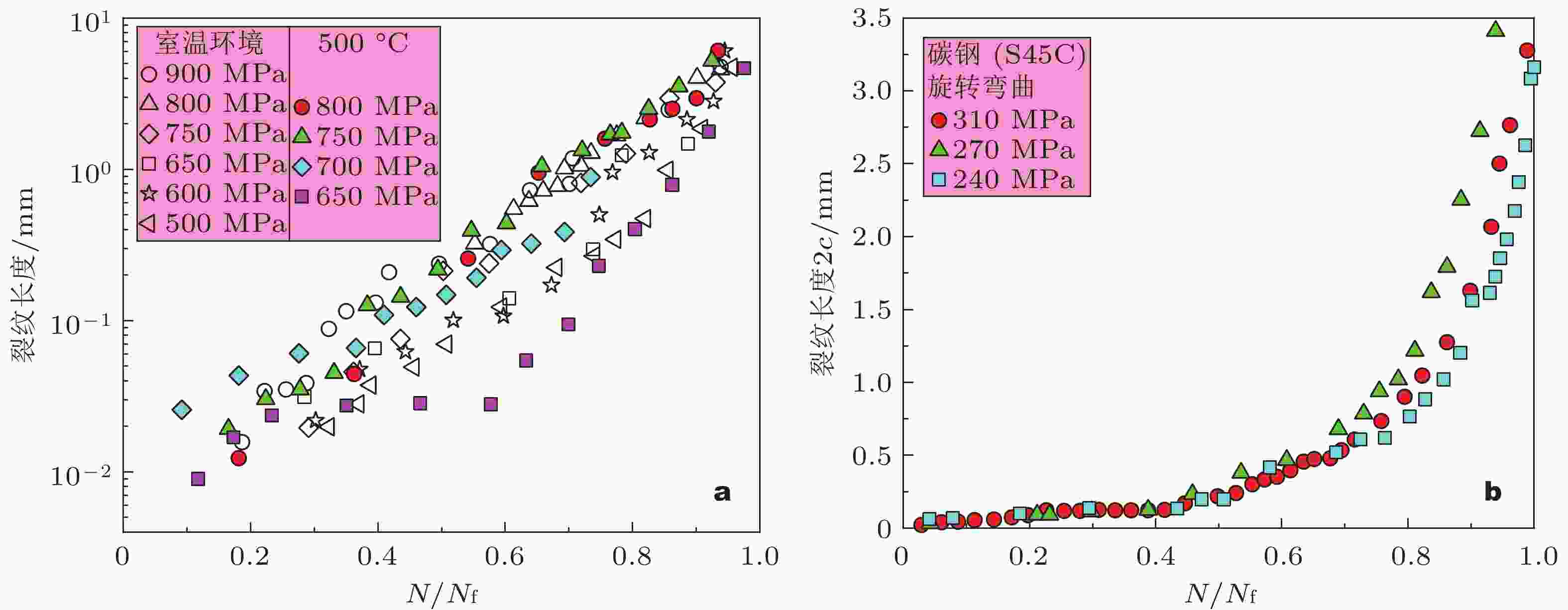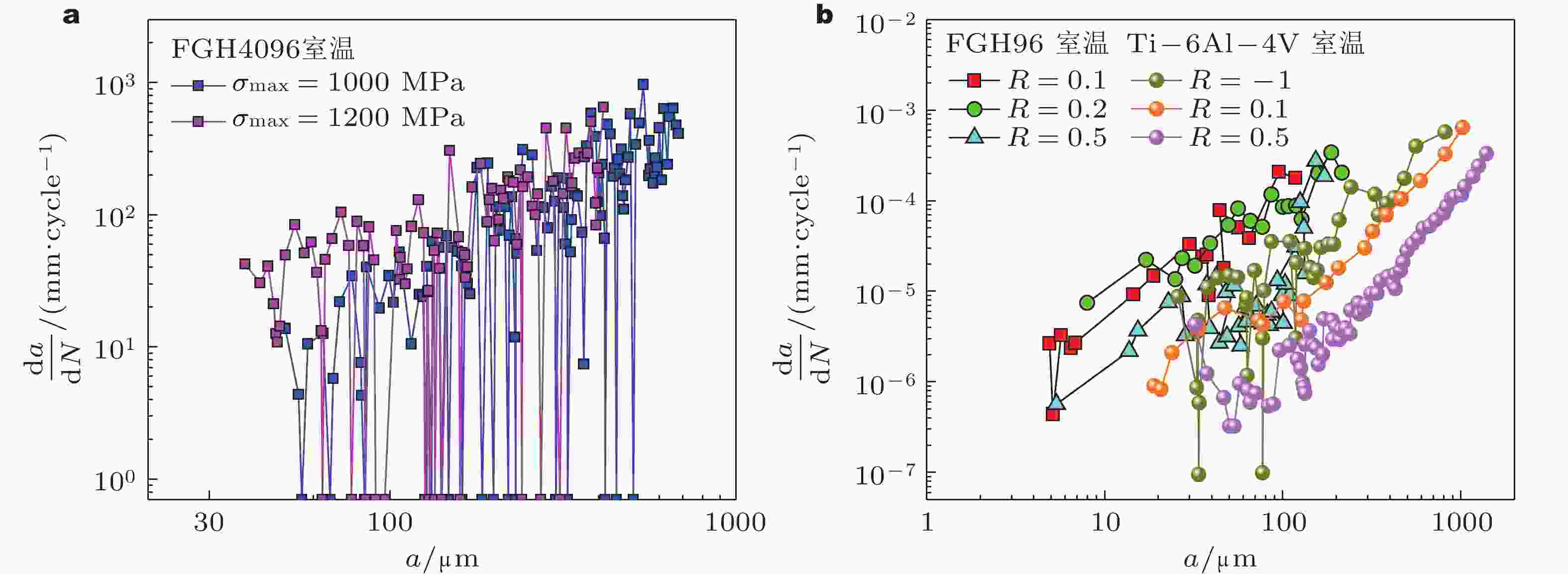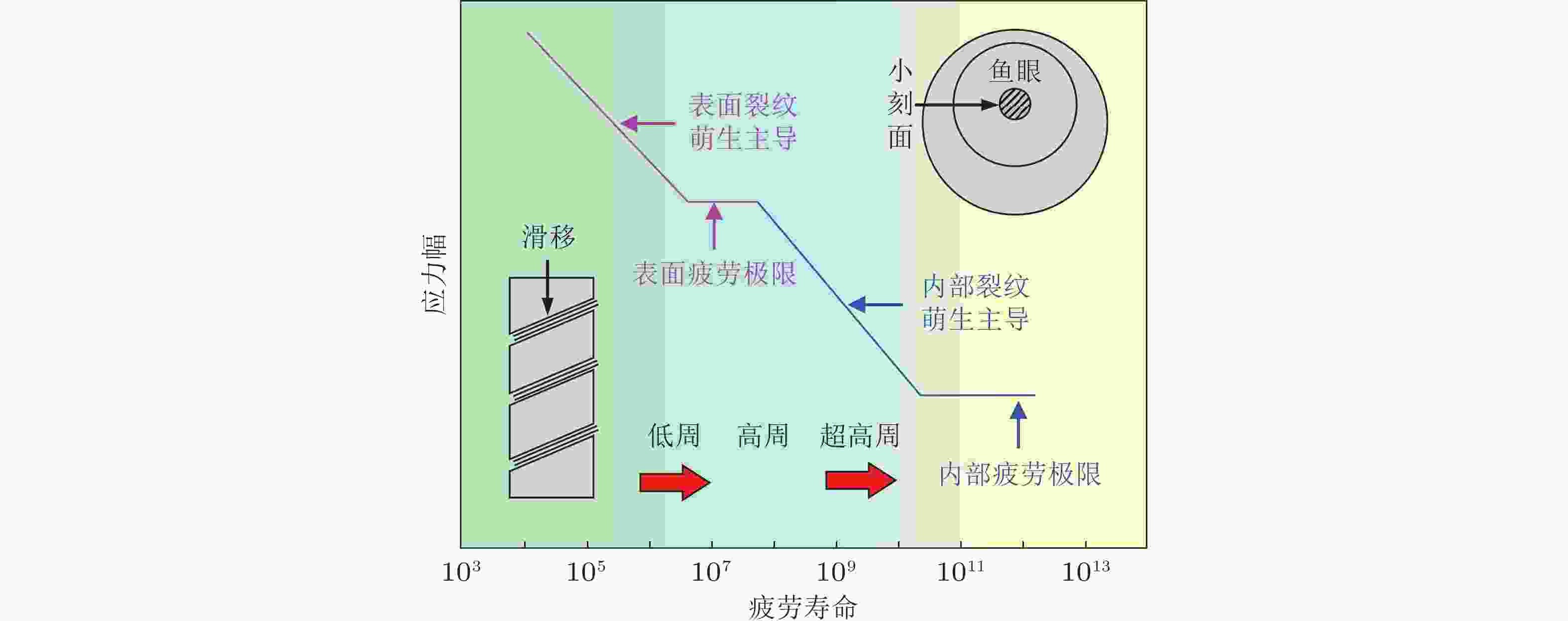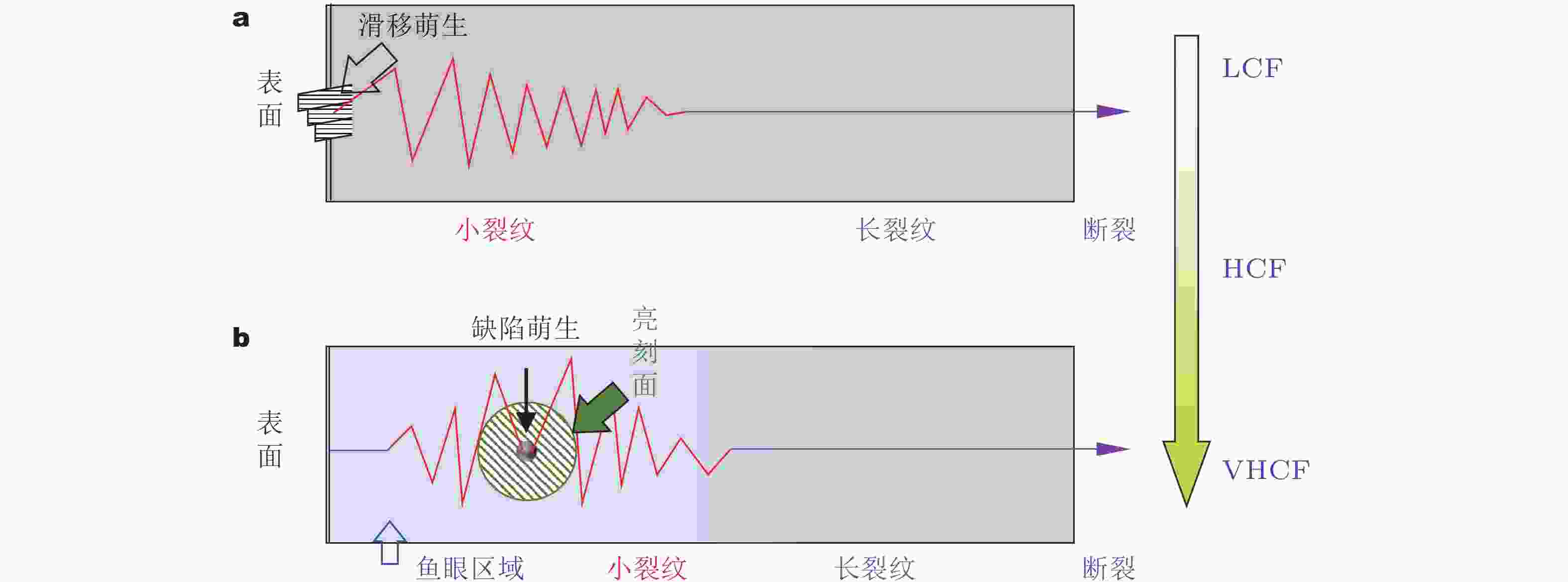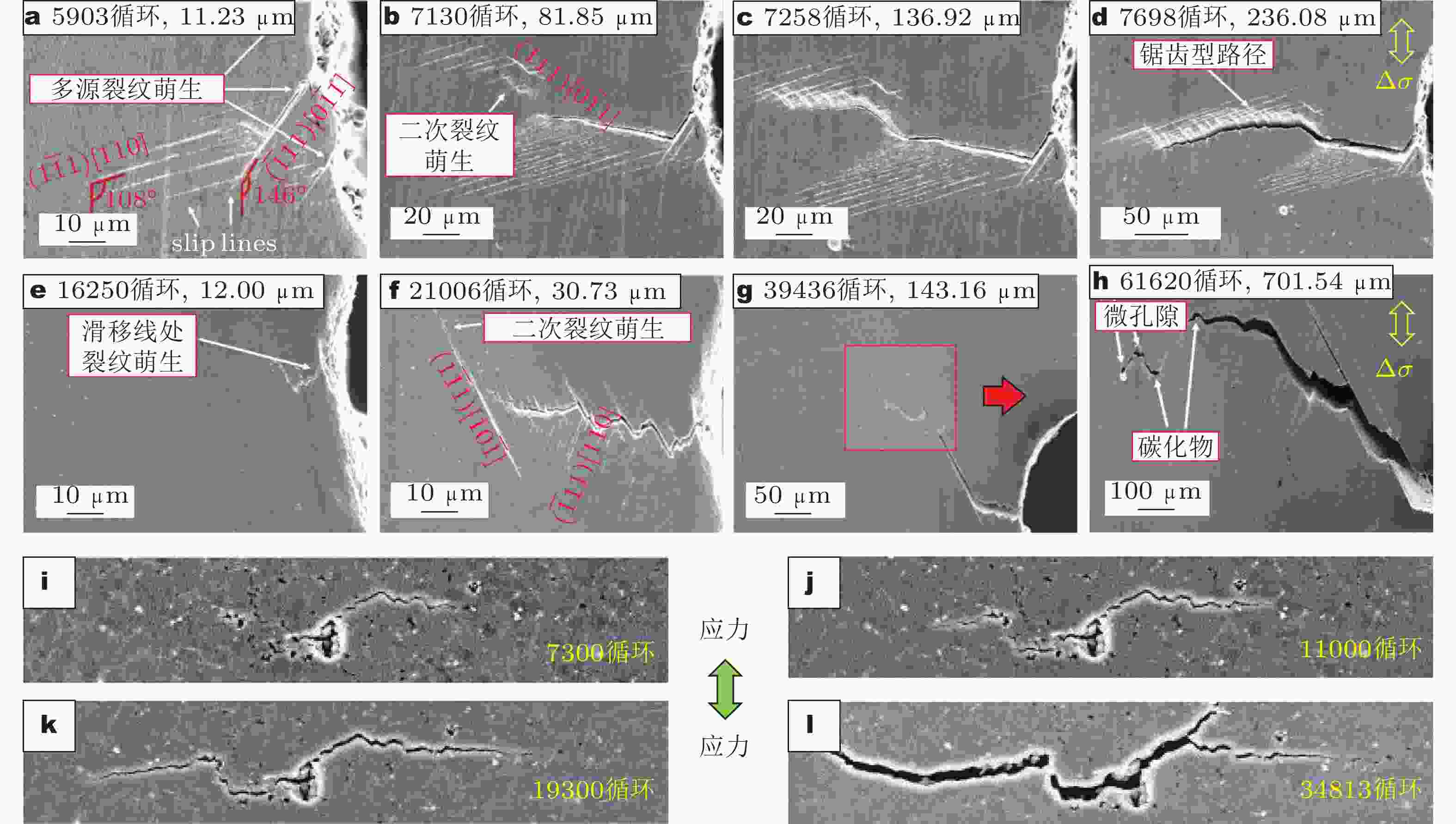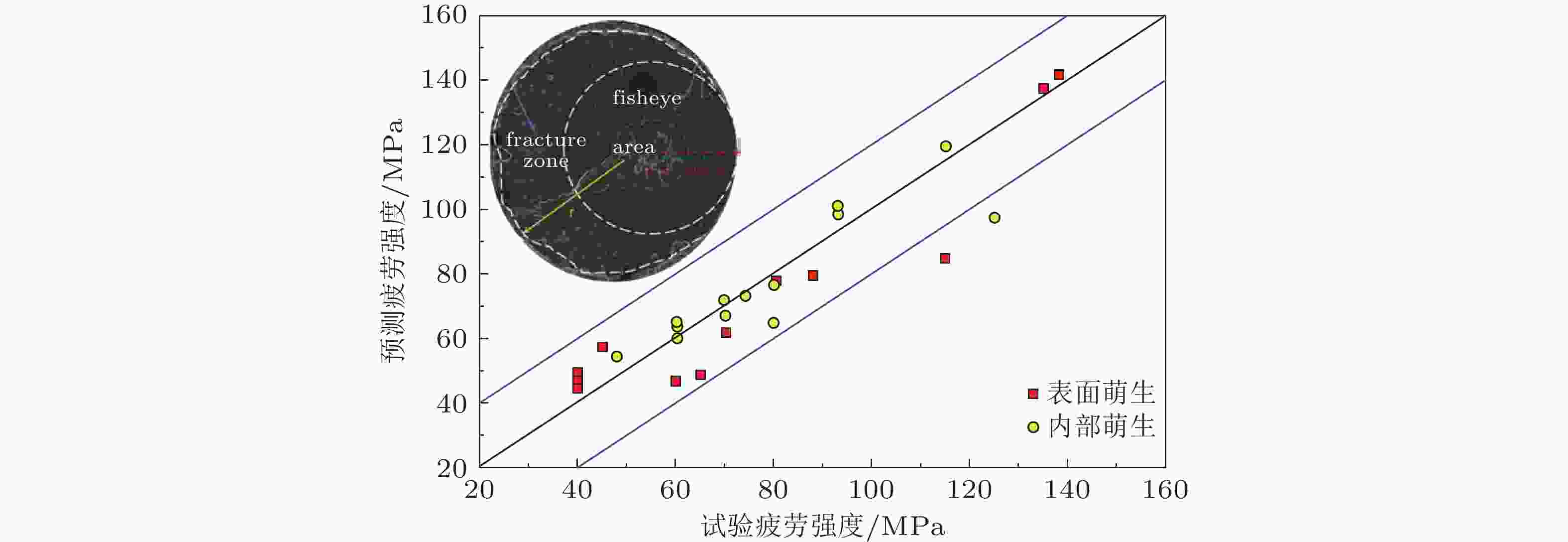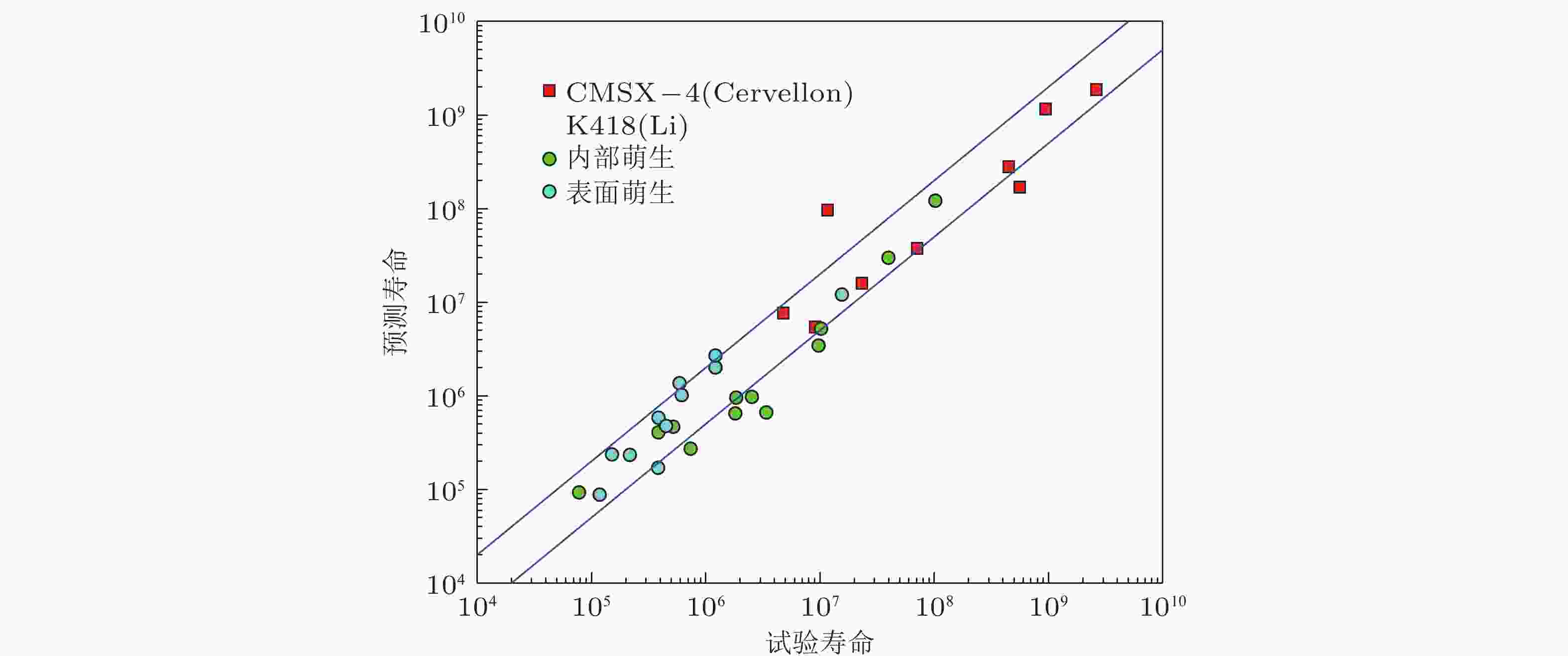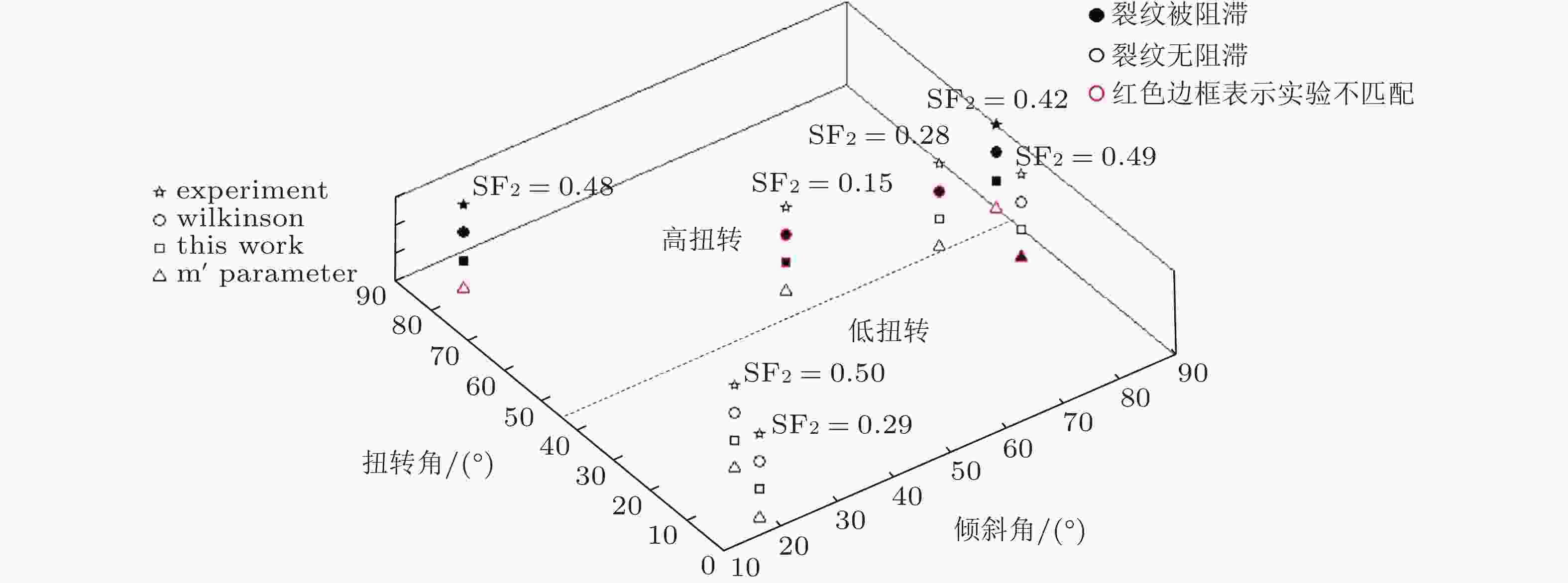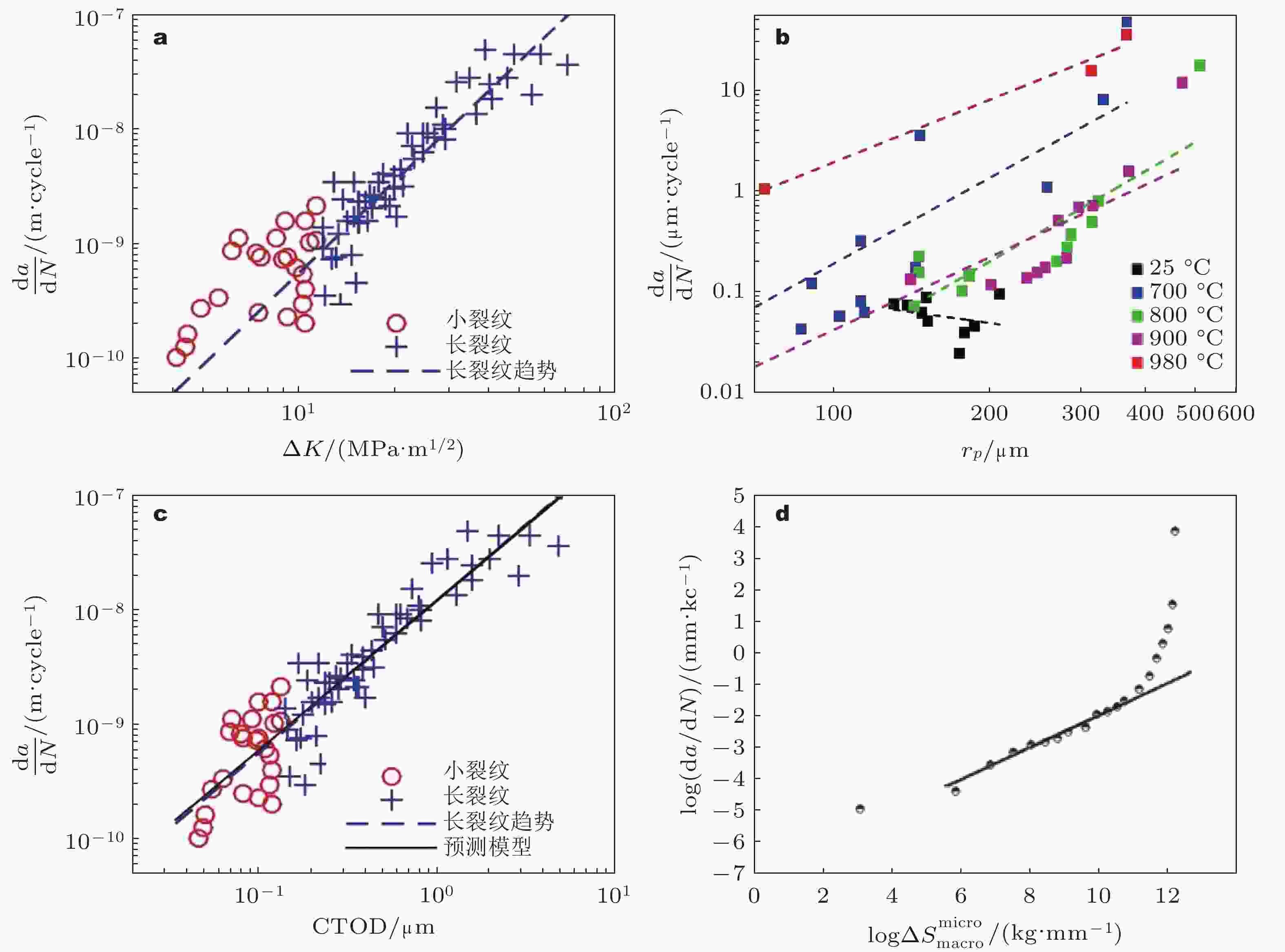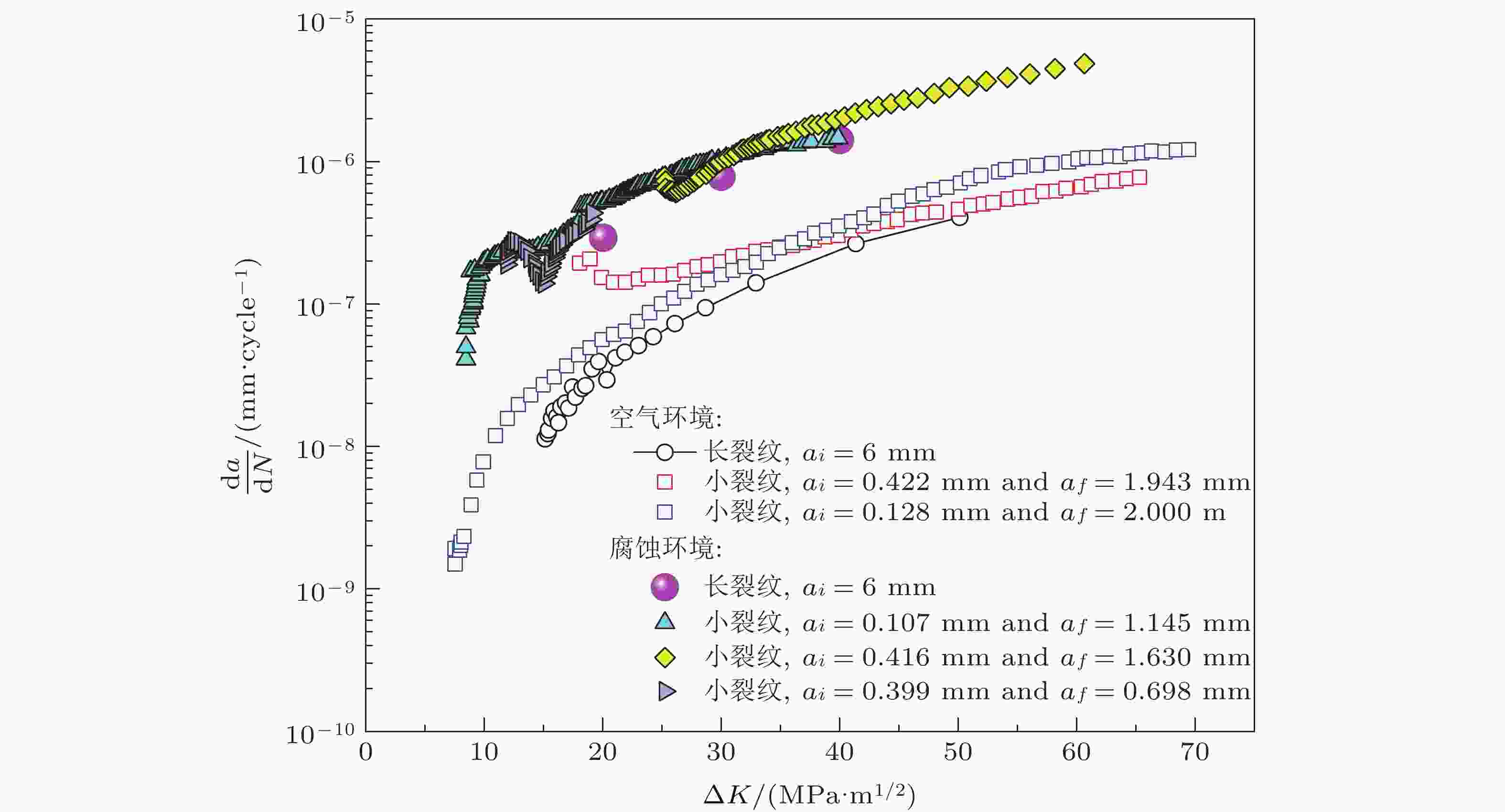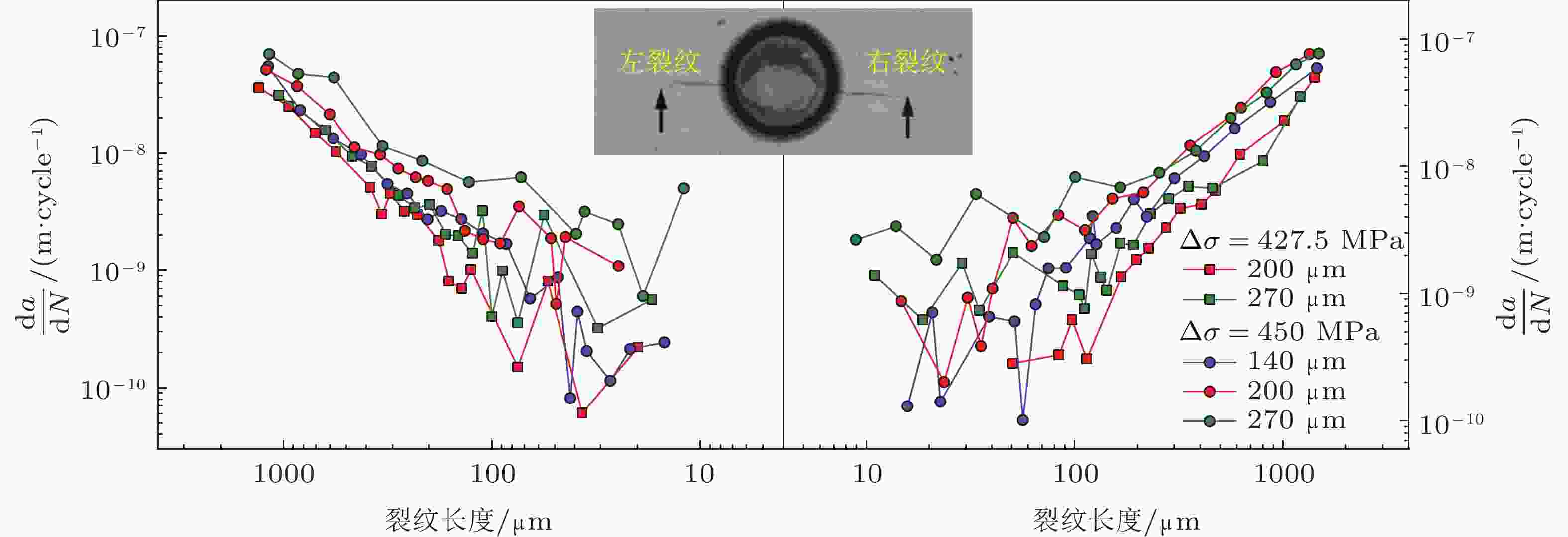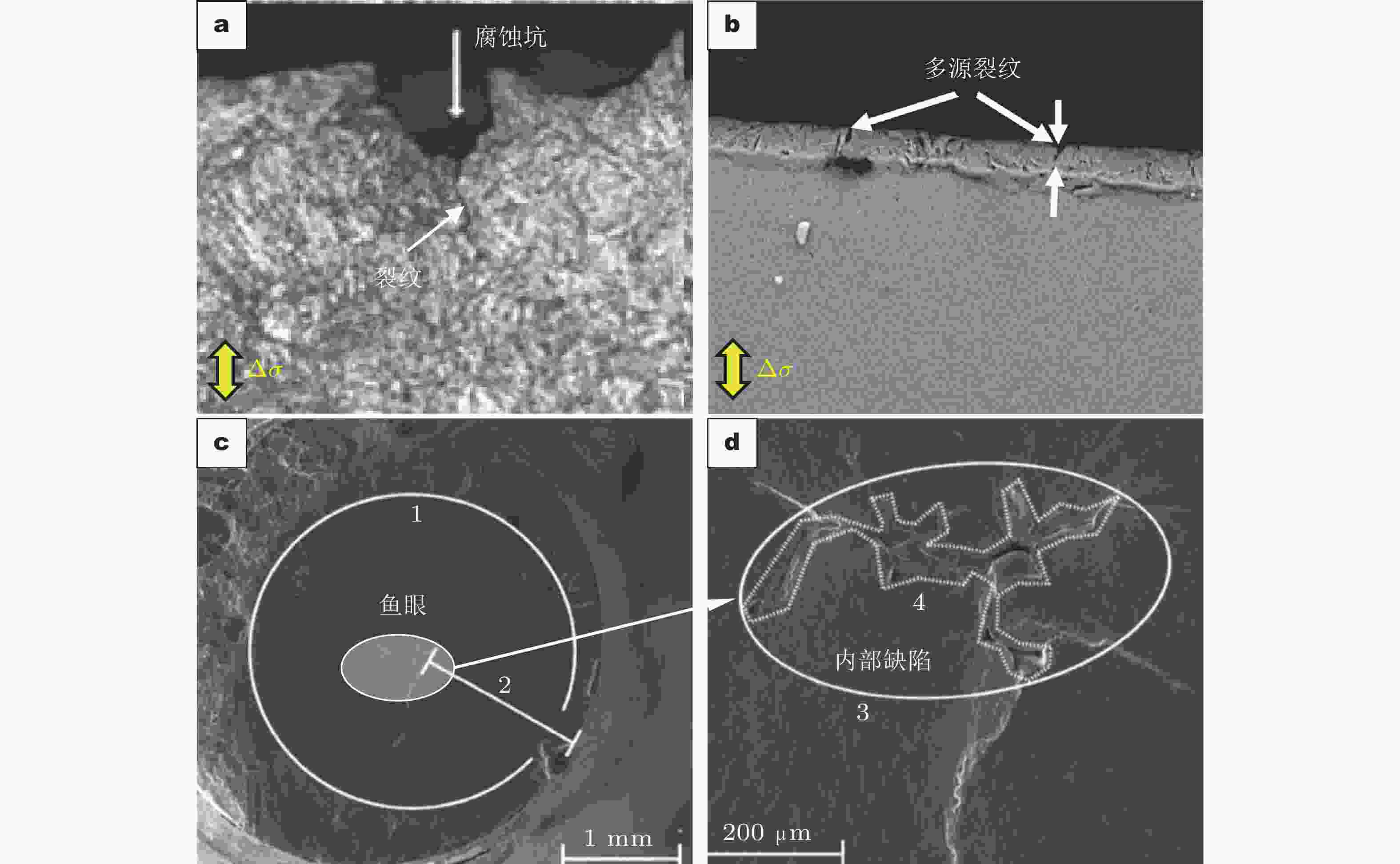-
摘要: 疲劳小裂纹扩展作为疲劳开裂过程中的关键阶段之一, 显著影响着材料和结构的疲劳断裂过程. 因具有速率波动和扩展路径偏转等特点, 小裂纹效应给材料和结构疲劳寿命预测结果带来了不确定性, 从而影响燃气涡轮发动机等机械结构的服役安全. 本文围绕燃气涡轮发动机关键部件材料的疲劳小裂纹扩展问题, 首先总结了当前疲劳小裂纹的扩展规律及其对疲劳寿命的影响规律; 其次, 针对先进燃气涡轮发动机关键部件常用的多晶合金和单晶合金, 揭示了疲劳小裂纹的萌生和扩展机理; 再次, 对疲劳小裂纹扩展模型进行了总结, 且指出了各模型的优缺点; 从次, 重点针对先进燃气涡轮发动机热端部件的工作环境, 综述了热腐蚀/氧化介质中的疲劳小裂纹扩展行为和模型; 最后, 对当前疲劳小裂纹相关研究进行了总结, 且结合燃气涡轮发动机领域提出了未来的研究趋势与方向. 本文以期为先进燃气涡轮发动机关键部件的设计、安全评估和寿命预测提供理论知识和科学方法.Abstract: The growth behavior of small cracks, as one of the key stages in the fatigue cracking process, significantly affects the fatigue fracture process of materials and structures. Due to the characteristics of rate fluctuation and expansion path deflection, the small crack effect brings uncertainty to the fatigue life prediction results of materials and structures. It brings uncertainty to the fatigue life prediction results of materials and structures. Therefore, it affects the service safety of mechanical structures such as gas turbines. It focuses on the problem of fatigue small crack propagation in key component materials of gas turbine engines. Firstly, a review was conducted on its laws, and impact on the overall life of materials; Subsequently, the initiation and propagation mechanism of small fatigue cracks is deeply revealed based on polycrystalline and single crystal alloys of advanced gas turbine hot section component materials; Once again, corresponding fatigue small crack growth models were summarized, and the advantages and disadvantages of each model were pointed out; Meanwhile, the fatigue small crack growth behavior and models in hot corrosion/oxidation media are reviewed and discussed combined with the working environment of advanced gas turbine hot section components; Finally, the current research on small cracks was summarized and future research trends were proposed. This review aims to provide theoretical support for the design, safety assessment, and life prediction of key components in advanced gas turbines.
-
Key words:
- Gas turbine /
- fatigue small crack /
- growth model /
- corrosion fatigue /
- safety assessment /
- life prediction
-
图 2 Pearson (1975)的疲劳小裂纹扩展试验结果
图 3 Ye等(2017a)的疲劳裂纹扩展数据 (其中Ni是检测到裂纹尺寸首次扩展的循环次数)
图 4 (a)高温合金Inconel 718在室温和500 ℃下的疲劳小裂纹扩展行为(Goto et al. 2002), (b)碳钢S45C的旋转弯曲疲劳小裂纹扩展行为(Tokaji et al. 1988)
图 5 预制裂纹和普通平板试样疲劳期间裂纹的生长(Miller 1982)
图 6 (a)应力比R为0.1时, 不同峰值应力对合金裂纹扩展速率的影响规律 (缺陷左侧裂纹)(Yang et al. 2022), (b)FGH96合金 (σmax = 950 MPa) 和Ti–6Al–4V合金 (σmax = 690 MPa) 在不同应力比下裂纹长度a和裂纹扩展速率的规律(Liu et al. 2023, Caton et al. 2012)
图 7 不同材料微观组织对疲劳小裂纹扩展规律的影响. (a) Inconel 617晶粒尺寸对小裂纹扩展速率的影响(Liang et al. 2022), (b) 650 ℃下GH4169晶粒尺寸对小裂纹扩展速率的影响(Zhu et al. 2019), (c) CP-Ti合金中微孔隙尺寸对疲劳小裂纹扩展速率的影响(Tao et al. 2023)
图 8 定向凝固合金DZ4和单晶合金NBSCS在不同温度下的小裂纹扩展速率(Ma & Shi 2012, Liang et al. 2019)
图 9 不含夹杂物材料的多阶段型S-N曲线(Mughrabi 2006)
图 10 从LCF到VHCF区域不同合金的疲劳裂纹萌生机制. Ni200 (Chan et al. 2009); FGH96 (Shi et al. 2020); 贝氏体/马氏体多相钢(Gui et al. 2021); GH4169 (Qin et al. 2023a)
图 12 高强度低合金钢SCM435的奥氏体晶界对疲劳小裂纹扩展的影响(Tokaji et al. 1986b). (a)小尺寸晶粒, (b)大尺寸晶粒
图 13 多晶合金的疲劳小裂纹扩展机制. (a)晶界对小裂纹扩展的影响行为, (b1) ~ (b4)疲劳小裂纹扩展的原位显微图像(Tao et al. 2023)
图 14 不同取向单晶合金的疲劳小裂纹萌生和扩展过程. (a) ~ (d)[001], (e) ~ (f)[111] (Zhang et al. 2019); (i) ~ (k)固定循环数下源于孔隙处的疲劳小裂纹扩展行为(Gall et al. 2004)
图 16 Kitagawa-Takahashi图中纯疲劳和热腐蚀疲劳的损伤机制比较. (a)纯疲劳和(b)热腐蚀疲劳(Chan et al. 2013)
图 17 预制坑试样疲劳试验的修正Kitagawa-Takahashi图. (a)空气和300 × 10−6 Cl−溶液, (b) 6 × 10−6 Cl−溶液(Schönbauer et al. 2014)
图 18 考虑裂纹萌生位置的疲劳强度预测结果(Qian et al. 2020)
图 21 含晶界特征的疲劳小裂纹模型 (不同扭转角和倾斜角) 预测结果对比(Panwar et al. 2018)
图 22 不同裂纹扩展参量和小裂纹扩展速率之间的关系对比. (a) GH4169合金的驱动力参数应力强度因子K与裂纹扩展速率, (b)不同温度下的镍基单晶合金NBSCS的驱动力参数塑性区尺寸rp和小裂纹扩展速率, (c) GH4169合金的驱动力参数裂纹张开位移CTOD与裂纹扩展速率, (d) 2024-T3铝合金的驱动力参数应变能强度因子范围∆S和小裂纹扩展速率(强度因子范围∆S和小裂纹扩展速率(Zhang et al. 2022, Liang et al. 2019, Sih & Tang 2014)
图 23 不同取向的CMSX-4合金在高温环境中的裂纹扩展模式(Chen et al. 2023). (a) ~ (d)不同取向的试样, (e)不同温度下裂纹的扩展模式
图 25 汽轮机叶片钢FV566在空气和腐蚀环境 (90 ℃: 300 × 10−9 Cl− + 300 × 10−9
$ {\mathrm{S}\mathrm{O}}_{4}^{2-} $ ) 中的小裂纹和长裂纹扩展速率(Turnbull & Zhou 2012)图 26 不同腐蚀坑尺寸下, X65钢的裂纹扩展速率与裂纹长度的关系图(Fatoba & Akid 2022)
图 27 (a)VHCF下R5钢腐蚀坑处的疲劳裂纹萌生(Pérez-Mora et al. 2015), (b) HCF下IN718合金腐蚀层处的疲劳裂纹萌生(Pradhan et al. 2018), (c) VHCF下铸钢G42CrMo4在500 ℃环境中的断裂表面和(d)裂纹萌生位置放大图(Schmiedel et al. 2020)
表 1 小裂纹的分类及特点
小裂纹类型 裂纹尺寸 主要影响因素 理论框架 微观小裂纹 a<d 材料微观组织结构, 如晶粒取向、
晶界以及第二相等不适用连续介质力学 力学小裂纹 a<rp 裂纹尖端塑性区诱导闭合 (物理小裂纹
也包含部分力学小裂纹)修正的弹性断裂力学和
弹塑性断裂力学物理小裂纹 a>d且a<1 mm 化学小裂纹 a较大 裂纹尖端环境类型 需考虑环境因素 -
[1] Akid R, Miller K J. 1991. Short fatigue crack growth behaviour of a low carbon steel under corrosion fatigue conditions. 14 : 637-649. [2] Bache M R, Evans W J, Mcelhone M. 1997. The effects of environment and internal oxygen on fatigue crack propagation in ti-6al-4v. Materials Science and Engineering:A, 234-236: 918-922. doi: 10.1016/S0921-5093(97)00402-4 [3] Balbín J A, Chaves V, Larrosa N O. 2021. Pit to crack transition and corrosion fatigue lifetime reduction estimations by means of a short crack microstructural model. Corrosion Science, 180: 109171. doi: 10.1016/j.corsci.2020.109171 [4] Bang D J, Ince A. 2020. A short and long crack growth model based on 2-parameter driving force and crack growth thresholds. International Journal of Fatigue, 141: 105870. doi: 10.1016/j.ijfatigue.2020.105870 [5] Behvar A, Haghshenas M. 2023. A critical review on very high cycle corrosion fatigue: Mechanisms, methods, materials, and models. Journal of Space Safety Engineering, 10: 284-323. doi: 10.1016/j.jsse.2023.05.002 [6] Bettge D, Österle W. 1999. “Cube slip” in near-[111] oriented specimens of a single-crystal nickel-base superalloy. Scripta Materialia, 40: 389-395. doi: 10.1016/S1359-6462(98)00446-1 [7] Caton M J, John R, Porter W J, et al. 2012. Stress ratio effects on small fatigue crack growth in Ti–6Al–4V. International Journal of Fatigue, 38: 36-45. doi: 10.1016/j.ijfatigue.2011.11.004 [8] Caton M J, Jones J W, Allison J E. 2001. The influence of heat treatment and solidification time on the behavior of small-fatigue-cracks in a cast aluminum alloy. Materials Science and Engineering:A, 314: 81-85. doi: 10.1016/S0921-5093(00)01916-X [9] Cervellon A, Cormier J, Mauget F, et al. 2017. VHCF life evolution after microstructure degradation of a Ni-based single crystal superalloy. International Journal of Fatigue, 104: 251-262. doi: 10.1016/j.ijfatigue.2017.07.021 [10] Chan K S, Enright M P, Moody J, et al. 2014. A Microstructure-Based Time-Dependent Crack Growth Model for Life and Reliability Prediction of Turbopropulsion Systems. Metallurgical and Materials Transactions A, 45: 287-301. doi: 10.1007/s11661-013-1971-9 [11] Chan K S, Enright M P, Moody J P. 2013. Development of a Probabilistic Methodology for Predicting Hot Corrosion Fatigue Crack Growth Life of Gas Turbine Engine Disks. ASME Turbo Expo 2013: Turbine Technical Conference and Exposition. [12] Chan K S, Lankford J. 1988. The role of microstructural dissimilitude in fatigue and fracture of small cracks. Acta Metallurgica, 36: 193-206. doi: 10.1016/0001-6160(88)90038-7 [13] Chan K S, Tian J W, Yang B, et al. 2009. Evolution of Slip Morphology and Fatigue Crack Initiation in Surface Grains of Ni200. Metallurgical and Materials Transactions A, 40: 2545-2556. doi: 10.1007/s11661-009-9980-4 [14] Chanyathunyaroj K, Phetchcrai S, Laungsopapun G, et al. 2020. Fatigue characteristics of 6061 aluminum alloy subject to 3.5% NaCl environment. International Journal of Fatigue, 133: 105420. doi: 10.1016/j.ijfatigue.2019.105420 [15] Chapetti M D. 2003. Fatigue propagation threshold of short cracks under constant amplitude loading. International Journal of Fatigue, 25: 1319-1326. doi: 10.1016/S0142-1123(03)00065-3 [16] Chen X, Hu D, Sakaguchi M. 2023. Temperature dependent transition from Mode I to crystallographic cracking in a Ni-base single crystal superalloy. Theoretical and Applied Fracture Mechanics, 124: 103795. doi: 10.1016/j.tafmec.2023.103795 [17] Chowdhury P, Sehitoglu H. 2016. Mechanisms of fatigue crack growth – a critical digest of theoretical developments. Fatigue & Fracture of Engineering Materials & Structures, 39: 652-674. [18] Cini A, Irving P E. 2017. Development of fatigue cracks from mechanically machined scratches on 2024-T351 aluminium alloy—Part II: finite element analysis and prediction method. Fatigue & Fracture of Engineering Materials & Structures, 40: 853-868. [19] Demulsant X, Mendez J. 1996. Influence of environment on low cycle fatigue damage in Ti6Al4V and Ti 6246 titanium alloys. Materials Science and Engineering:A, 219: 202-211. doi: 10.1016/S0921-5093(96)10426-3 [20] Deng G J, Tu S T, Zhang X C, et al. 2015. Grain size effect on the small fatigue crack initiation and growth mechanisms of nickel-based superalloy GH4169. Engineering Fracture Mechanics, 134: 433-450. doi: 10.1016/j.engfracmech.2015.01.002 [21] Ding Y S, Tsay L W, Chen C. 2009. The effects of hydrogen on fatigue crack growth behaviour of Ti–6Al–4V and Ti–4.5Al–3V–2Mo–2Fe alloys. Corrosion Science, 51: 1413-1419. doi: 10.1016/j.corsci.2009.03.031 [22] Döring R, Hoffmeyer J, Seeger T, et al. 2006. Short fatigue crack growth under nonproportional multiaxial elastic–plastic strains. International Journal of Fatigue, 28: 972-982. doi: 10.1016/j.ijfatigue.2005.08.012 [23] Fatoba O, Akid R. 2022. On the behaviour of small fatigue cracks emanating from corrosion pits: Part I – The influence of mechanical factors. Theoretical and Applied Fracture Mechanics, 117: 103154. doi: 10.1016/j.tafmec.2021.103154 [24] Gabb T P, Telesman J, Hazel B, et al. 2010. The Effects of Hot Corrosion Pits on the Fatigue Resistance of a Disk Superalloy. Journal of Materials Engineering and Performance, 19: 77-89. doi: 10.1007/s11665-009-9399-5 [25] Gaddam R, Pederson R, Hörnqvist M, et al. 2014. Fatigue crack growth behaviour of forged Ti–6Al–4V in gaseous hydrogen. Corrosion Science, 78: 378-383. doi: 10.1016/j.corsci.2013.08.009 [26] Gall K, Biallas G, Maier H J, et al. 2004. In-situ observations of high cycle fatigue mechanisms in cast AM60B magnesium in vacuum and water vapor environments. International Journal of Fatigue, 26: 59-70. doi: 10.1016/S0142-1123(03)00079-3 [27] Gangloff R P. 1985. Crack size effects on the chemical driving force for aqueous corrosion fatigue. Metallurgical Transactions A, 16: 953-969. doi: 10.1007/BF02814848 [28] Gao Y K, Wu X R. 2011. Experimental investigation and fatigue life prediction for 7475-T7351 aluminum alloy with and without shot peening-induced residual stresses. Acta Materialia, 59: 3737-3747. doi: 10.1016/j.actamat.2011.03.013 [29] Geathers J, Torbet C J, Jones J W, et al. 2022. Examining the role of water vapor on small fatigue crack growth behavior in Ti-6242S using ultrasonic fatigue and scanning electron microscopy. International Journal of Fatigue, 156: 106672. doi: 10.1016/j.ijfatigue.2021.106672 [30] Goto M, Yamomoto T, Kawagoishi N, et al. 2002. Growth behaviour of small surface cracks in inconel 718 superalloy. European Structural Integrity Society. [31] Gui X, Gao G, An B, et al. 2021. Relationship between non-inclusion induced crack initiation and microstructure on fatigue behavior of bainite/martensite steel in high cycle fatigue/very high cycle (HCF/VHCF) regime. Materials Science and Engineering:A, 803: 140692. doi: 10.1016/j.msea.2020.140692 [32] El Haddad M H, Smith K, Topper T. 1979. Fatigue Crack Propagation of Short Cracks. Journal of Engineering Materials and Technology-transactions of The Asme - J Eng Mater Technol, 101: 42-46. doi: 10.1115/1.3443647 [33] El Haddad M H, Topper T H, Smith K N. 1979. Prediction of non propagating cracks. Engineering Fracture Mechanics, 11: 573-584. doi: 10.1016/0013-7944(79)90081-X [34] Han S, Yang X, Shi D, et al. 2020. Microstructure-sensitive modeling of competing failure mode between surface and internal nucleation in high cycle fatigue. International Journal of Plasticity, 126: 102622. doi: 10.1016/j.ijplas.2019.11.001 [35] Hassanipour M, Watanabe S, Hirayama K, et al. 2019. Effects of 3D microstructural distribution on short crack growth behavior in two bimodal Ti–6Al–4V alloys. Materials Science and Engineering:A, 766: 138264. doi: 10.1016/j.msea.2019.138264 [36] Hobson P, Brown M, De Los Rios E. 1986. Two phases of short crack growth in a medium carbon steel. 441-459. [37] Hobson P D. 1982. The formulation of a crack growth equation for short cracks. Fatigue & Fracture of Engineering Materials & Structures, 5: 323-327. [38] Hong Y, Zhao A, Qian G, et al. 2012. Fatigue Strength and Crack Initiation Mechanism of Very-High-Cycle Fatigue for Low Alloy Steels. Metallurgical and Materials Transactions A, 43: 2753-2762. doi: 10.1007/s11661-011-0816-7 [39] Hou J, Tang K, Wu H. 2020. Short review on multiscale short fatigue crack growth model. Material Design & Processing Communications, 2: e93. [40] Hu D, Wang T, Ma Q, et al. 2019. Effect of inclusions on low cycle fatigue lifetime in a powder metallurgy nickel-based superalloy FGH96. International Journal of Fatigue, 118: 237-248. doi: 10.1016/j.ijfatigue.2018.09.019 [41] Hu T, Li W, Yuan S, et al. 2022. Multiscale analysis of interior cracking behavior of Ni-based superalloy fabricated by selective laser melting under very-high-cycle-fatigue at high-temperature. Materials Today Communications, 33: 104356. doi: 10.1016/j.mtcomm.2022.104356 [42] Hudak Jr. S J. 1981. Small Crack Behavior and the Prediction of Fatigue Life. Journal of Engineering Materials and Technology, 103: 26-35. doi: 10.1115/1.3224969 [43] Hyzak J M, Bernstein I M. 1982. The effect of defects on the fatigue crack initiation process in two p/m superalloys: part i. fatigue origins. Metallurgical Transactions A, 13: 33-43. doi: 10.1007/BF02642413 [44] Kitagawa, Takahashi. 1976. Applicability of fracture mechanics to very small cracks or the cracks in the early stage. Proc. 2nd Int. Conf. on Mechanical Behaviour of Materials: 627-631. [45] Lankford J. 1977. Initiation and early growth of fatigue cracks in high strength steel. Engineering Fracture Mechanics, 9: 617-624. doi: 10.1016/0013-7944(77)90074-1 [46] Lankford J. 1982. The growth of small fatigue cracks in 7075–T6 Aluminum. Fatigue & Fracture of Engineering Materials & Structures, 5: 233-248. [47] Li K, Ashbaugh N E, Rosenberger A H. 2004. Crystallographic Initiation of Nickel-Base Superalloy IN100 at RT and 538C Under Low Cycle Fatigue Conditions. Proceedings of the International Symposium on Superalloys. 251-258. [48] Li X, Li W, Hu T, et al. 2023. A novel very-high-cycle-fatigue life prediction model with interior microstructure induced cracking behavior of Inconel-713C superalloy at 25 °C, 750 °C and 1000 °C. Theoretical and Applied Fracture Mechanics, 123: 103705. doi: 10.1016/j.tafmec.2022.103705 [49] Li X, Zhang Y, Li W, et al. 2021. Very high cycle fatigue of a nickel-based superalloy at room and elevated temperatures: Interior failure behavior and life prediction. International Journal of Fatigue, 151: 106349. doi: 10.1016/j.ijfatigue.2021.106349 [50] Liang J, Wang Z, Xie H, et al. 2019. In situ scanning electron microscopy analysis of effect of temperature on small fatigue crack growth behavior of nickel-based single-crystal superalloy. International Journal of Fatigue, 128: 105195. doi: 10.1016/j.ijfatigue.2019.105195 [51] Liang Z, Liu A, Wang X S, et al. 2022. Experimental and modeling study on small fatigue crack initiation and propagation behavior of Inconel 617. International Journal of Fatigue, 164: 107158. doi: 10.1016/j.ijfatigue.2022.107158 [52] Liu A, Zhang Y T, Wang X S, et al. 2023. Evaluation of the influences of the stress ratio, temperatures, and local microstructure on small fatigue crack propagation behavior of the FGH96 superalloy. International Journal of Fatigue, 171: 107573. doi: 10.1016/j.ijfatigue.2023.107573 [53] Luster J, Morris M A. 1995. Compatibility of deformation in two-phase Ti-Al alloys: Dependence on microstructure and orientation relationships. Metallurgical and Materials Transactions A, 26: 1745-1756. doi: 10.1007/BF02670762 [54] Lütjering G. 1998. Influence of processing on microstructure and mechanical properties of (α + β) titanium alloys. Materials Science and Engineering:A, 243: 32-45. doi: 10.1016/S0921-5093(97)00778-8 [55] Ma X, Shi H J. 2012. On the fatigue small crack behaviors of directionally solidified superalloy DZ4 by in situ SEM observations. International Journal of Fatigue, 35: 91-98. doi: 10.1016/j.ijfatigue.2010.11.010 [56] Mahobia G S, Paulose N, Mannan S L, et al. 2014. Effect of hot corrosion on low cycle fatigue behavior of superalloy IN718. International Journal of Fatigue, 59: 272-281. doi: 10.1016/j.ijfatigue.2013.08.009 [57] Maierhofer J, Pippan R, Gänser H P. 2014. Modified NASGRO equation for physically short cracks. International Journal of Fatigue, 59: 200-207. doi: 10.1016/j.ijfatigue.2013.08.019 [58] Mbuya T O, Gu Y, Thomson R C, et al. 2017. Effect of intermetallic particles and grain boundaries on short fatigue crack growth behaviour in a cast Al–4Cu–3Ni–0.7Si piston alloy. Fatigue & Fracture of Engineering Materials & Structures, 40: 1428-1442. [59] Miller, K J. 1991. Metal fatigue—past, current and future. ARCHIVE Proceedings of the Institution of Mechanical Engineers Part C Journal of Mechanical Engineering Science, 36 : 291-304. [60] Miller K J. 1982. The short crack problem. Fatigue & Fracture of Engineering Materials & Structures, 5: 223-232. [61] Miller K J. 1987. The behaviour of short fatigue cracks and their initiation part ii-a general summary. Fatigue & Fracture of Engineering Materials & Structures, 10: 93-113. [62] Miller K J. Short Fatigue Cracks. 1989. Advances in Fatigue Science and Technology: 3-22. [63] Miller K J. 1993a. Materials science perspective of metal fatigue resistance. Materials Science and Technology, 9: 453-462. doi: 10.1179/mst.1993.9.6.453 [64] Miller K J. 1993b. The two thresholds of fatigue behaviour. Fatigue & Fracture of Engineering Materials & Structures, 16: 931-939. [65] Mughrabi. 1999. On the life-controlling microstructural fatigue mechanisms in ductile metals and alloys in the gigacycle regime. Fatigue & Fracture of Engineering Materials & Structures, 22: 633-641. [66] Mughrabi H. 2002. On ‘multi-stage’ fatigue life diagrams and the relevant life-controlling mechanisms in ultrahigh-cycle fatigue. Fatigue & Fracture of Engineering Materials & Structures, 25: 755-764. [67] Mughrabi H. 2006. Specific features and mechanisms of fatigue in the ultrahigh-cycle regime. International Journal of Fatigue, 28: 1501-1508. doi: 10.1016/j.ijfatigue.2005.05.018 [68] Murakam Y, Nomoto T, Ueda T. 1999. Factors influencing the mechanism of superlong fatigue failure in steels. Fatigue & Fracture of Engineering Materials & Structures, 22: 581-590. [69] Murakami Y. 2002. Effects Of Small Defects And Nonmetallic Inclusions. Metal Fatigue. [70] Murakami Y, Endo M. 1986. Effects of hardness and crack geometries on ΔKth of small cracks emanating from small defects. The Behaviour of Short Fatigue Cracks: 275-293. [71] Murtaza G, Akid R. 1996. Corrosion fatigue short crack growth behaviour in a high strength steel. International Journal of Fatigue, 18: 557-566. doi: 10.1016/0142-1123(95)00095-X [72] Navarro A, De Los Rios E R. 1988. A microstructurally-short fatigue crack growth equation. Fatigue & Fracture of Engineering Materials & Structures, 11: 383-396. [73] Newman, Wu, Swain, et al. 2000. Small-crack growth and fatigue life predictions for high-strength aluminium alloys. Part II: crack closure and fatigue analyses. Fatigue & Fracture of Engineering Materials & Structures, 23: 59-72. [74] Newman J. 1981. A crack-closure model for predicting fatigue crack growth under aircraft spectrum loading. ASTM special technical publications: 53–84. [75] Newman J C, Jr, Phillips E P, Swain M H, et al. 1992. Fatigue Mechanics: An Assessment of a Unified Approach to Life Prediction. Advances in Fatigue Lifetime Predictive Techniques, American Society for Testing and Materials: 5-27. [76] Newman J C, Jr. , Wu X R, Venneri S L, et al. 1994. Small-crack effects in high-strength aluminum alloys. NASA Langley Research Center Hampton, VA, United States. [77] Ochi Y, Matsumura T, Masaki K, et al. 2002. High-cycle rotating bending fatigue property in very long-life regime of high-strength steels. Fatigue & Fracture of Engineering Materials & Structures, 25: 823-830. [78] Owolabi G M, Whitworth H A. 2014. Modeling and Simulation of Microstructurally Small Crack Formation and Growth in Notched Nickel-base Superalloy Component. Journal of Materials Science & Technology, 30: 203-212. [79] Panwar S, Adams J F, Allison J E, et al. 2018. A grain boundary interaction model for microstructurally short fatigue cracks. International Journal of Fatigue, 113: 401-406. doi: 10.1016/j.ijfatigue.2018.04.029 [80] Pearson S. 1975. Initiation of fatigue cracks in commercial aluminium alloys and the subsequent propagation of very short cracks. Engineering Fracture Mechanics, 7: 235-247. doi: 10.1016/0013-7944(75)90004-1 [81] Pérez-Mora R, Palin-Luc T, Bathias C, et al. 2015. Very high cycle fatigue of a high strength steel under sea water corrosion: A strong corrosion and mechanical damage coupling. International Journal of Fatigue, 74: 156-165. doi: 10.1016/j.ijfatigue.2015.01.004 [82] Phillips P J, Unocic R R, Mills M J. 2013. Low cycle fatigue of a polycrystalline Ni-based superalloy: Deformation substructure analysis. International Journal of Fatigue, 57: 50-57. doi: 10.1016/j.ijfatigue.2012.11.008 [83] Piascik R S. 1999. The growth of small corrosion fatigue cracks in alloy 7075. NASA Langley Technical Report Server. [84] Piascik R, Willard S J F, Materials F O E, et al. 1994. The growth of small corrosion fatigue cracks in alloy 2024. 17 : 1247-1259. [85] Piascik R, Willard S. 1996. The growth of small corrosion fatigue cracks in Alloy 2024. 1 : 61. [86] Polák J, Zezulka P. 2005. Short crack growth and fatigue life in austenitic-ferritic duplex stainless steel. Fatigue & Fracture of Engineering Materials & Structures, 28: 923-935. [87] Pradhan D, Mahobia G S, Chattopadhyay K, et al. 2018. Effect of pre hot corrosion on high cycle fatigue behavior of the superalloy IN718 at 600 °C. International Journal of Fatigue, 114: 120-129. doi: 10.1016/j.ijfatigue.2018.05.021 [88] Przybyla C P, Mcdowell D L. 2012. Microstructure-sensitive extreme-value probabilities of high-cycle fatigue for surface vs. subsurface crack formation in duplex Ti–6Al–4V. Acta Materialia, 60: 293-305. doi: 10.1016/j.actamat.2011.09.031 [89] Qian G, Jian Z, Qian Y, et al. 2020. Very-high-cycle fatigue behavior of AlSi10Mg manufactured by selective laser melting: Effect of build orientation and mean stress. International Journal of Fatigue, 138: 105696. doi: 10.1016/j.ijfatigue.2020.105696 [90] Qin Z, Li B, Chen C, et al. 2023a. Crack initiation mechanisms and life prediction of GH4169 superalloy in the high cycle and very high cycle fatigue regime. Journal of Materials Research and Technology, 26: 720-736. doi: 10.1016/j.jmrt.2023.07.196 [91] Qin Z, Li B, Chen T, et al. 2023b. Comparative study of the effects of conventional shot peening and ultrasonic shot peening on very high cycle fatigue properties of GH4169 superalloy. International Journal of Fatigue, 175: 107799. doi: 10.1016/j.ijfatigue.2023.107799 [92] Rémy L, Geuffrard M, Alam A, et al. 2013. Effects of microstructure in high temperature fatigue: Lifetime to crack initiation of a single crystal superalloy in high temperature low cycle fatigue. International Journal of Fatigue, 57: 37-49. doi: 10.1016/j.ijfatigue.2012.10.013 [93] Sadananda K, Nani Babu M, Vasudevan A K. 2019. A review of fatigue crack growth resistance in the short crack growth regime. Materials Science and Engineering:A, 754: 674-701. doi: 10.1016/j.msea.2019.03.102 [94] Sakai T, Harada H, Oguma N. 2006. Crack initiation mechanism of bearing steel in very high cycle fatigue. Proceedings of ECF-16, CD-ROM. [95] Santus C, Taylor D. 2009. Physically short crack propagation in metals during high cycle fatigue. International Journal of Fatigue, 31: 1356-1365. doi: 10.1016/j.ijfatigue.2009.03.002 [96] Sarrazin-Baudoux C, Loubat F, Potiron S. 2006. On the role of water vapor and oxygen on the fatigue crack propagation behavior at 550 °C of a Ti6242 alloy. Metallurgical and Materials Transactions A, 37: 1201-1209. doi: 10.1007/s11661-006-1071-1 [97] Schmiedel A, Henkel S, Kirste T, et al. 2020. Ultrasonic fatigue testing of cast steel G42CrMo4 at elevated temperatures. Fatigue & Fracture of Engineering Materials & Structures, 43: 2455-2475. [98] Schönbauer B M, Stanzl-Tschegg S E, Perlega A, et al. 2014. Fatigue life estimation of pitted 12% Cr steam turbine blade steel in different environments and at different stress ratios. International Journal of Fatigue, 65: 33-43. doi: 10.1016/j.ijfatigue.2013.10.003 [99] Schönbauer B M, Yanase K, Endo M. 2017. The influence of various types of small defects on the fatigue limit of precipitation-hardened 17-4PH stainless steel. Theoretical and Applied Fracture Mechanics, 87: 35-49. doi: 10.1016/j.tafmec.2016.10.003 [100] Shi Y, Yang D, Yang X, et al. 2020. The effect of inclusion factors on fatigue life and fracture-mechanics-based life method for a P/M superalloy at elevated temperature. International Journal of Fatigue, 131: 105365. doi: 10.1016/j.ijfatigue.2019.105365 [101] Shiozawa K, Morii Y, Nishino S. 2006. Subsurface Crack Initiation and Propagation Mechanism under the Super-Long Fatigue Regime for High Speed Tool Steel (JIS SKH51) by Fracture Surface Topographic Analysis. JSME International Journal Series A Solid Mechanics and Material Engineering, 49: 1-10. doi: 10.1299/jsmea.49.1 [102] Shyam A, Allison J E, Jones J W. 2005. A small fatigue crack growth relationship and its application to cast aluminum. Acta Materialia, 53: 1499-1509. doi: 10.1016/j.actamat.2004.12.004 [103] Shyam A, Picard Y N, Jones J W, et al. 2004. Small fatigue crack propagation from micronotches in the cast aluminum alloy W319. Scripta Materialia, 50: 1109-1114. doi: 10.1016/j.scriptamat.2004.01.031 [104] Sih G C. 2009. Modeling of Multiscale Fatigue Crack Growth: Nano/Micro and Micro/Macro Transitions. Virtual Testing and Predictive Modeling: For Fatigue and Fracture Mechanics Allowables. [105] Sih G C, Tang K K. 2014. Short crack data derived from the fatigue data of 2024-T3 Al with long cracks: Material, load and geometry effects locked-in by transitional functions. Theoretical and Applied Fracture Mechanics, 71: 2-13. doi: 10.1016/j.tafmec.2014.02.005 [106] Stephens R R, Grabowski L, Hoeppner D W. 1993. The effect of temperature on the behaviour of short fatigue cracks in Waspaloy using an in situ SEM fatigue apparatus. International Journal of Fatigue, 15: 273-282. doi: 10.1016/0142-1123(93)90376-2 [107] Suresh S, Ritchie R O. 1984. Propagation of short fatigue cracks. International Metals Reviews, 29: 445-475. [108] Tanaka K. 2003. 4.04 - Fatigue Crack Propagation. Comprehensive Structural Integrity: 95-127. [109] Tang K, Du Z, Wu B, et al. 2020. Fatigue behavior prediction of metal alloys based on a unified multiscale crack growth model. Engineering Fracture Mechanics, 235: 107132. doi: 10.1016/j.engfracmech.2020.107132 [110] Tao Z, Chang L, Li J, et al. 2023. In-situ experimental investigation of the small fatigue crack behavior in CP-Ti: The influence of micronotch size. International Journal of Fatigue, 175: 107755. doi: 10.1016/j.ijfatigue.2023.107755 [111] Taylor D, Knott J F. 1981. Fatigue crack propagation behaviour of short cracks; the effect of microstructure. Fatigue & Fracture of Engineering Materials & Structures, 4: 147-155. [112] Toh S F, Rainforth W M. 1996. Fatigue of a nickel base superalloy with bimodal grain size. Materials Science and Technology, 12: 1007-1014. doi: 10.1080/02670836.1996.11665715 [113] Tokaji K, Ogawa T, Harada Y. 1986a. The growth of small fatigue cracks in a low carbon steel; he effect of microstructure and limitations of linear elastic fracture mechanics. Fatigue & Fracture of Engineering Materials & Structures, 9: 205-217. [114] Tokaji K, Ogawa T, Harada Y, et al. 1986b. Limitations of linear elastic fracture mechanics in respect of small fatigue cracks and microstructure. Fatigue & Fracture of Engineering Materials & Structures, 9: 1-14. [115] Tokaji K, Ogawa T, Ohya K. 1994. The effect of grain size on small fatigue crack growth in pure titanium. International Journal of Fatigue, 16: 571-578. doi: 10.1016/0142-1123(94)90483-9 [116] Tokaji K, Ogawa T, Osako S. 1988. The growth of microstructurally small fatigue cracks in a ferritic-pearlitic steel. Fatigue & Fracture of Engineering Materials & Structures, 11: 331-342. [117] Turnbull A. 2017. Characterising the early stages of crack development in environment-assisted cracking. Corrosion Engineering. Science and Technology, 52: 533-540. [118] Turnbull A, Horner D A, Connolly B J. 2009. Challenges in modelling the evolution of stress corrosion cracks from pits. Engineering Fracture Mechanics, 76: 633-640. doi: 10.1016/j.engfracmech.2008.09.004 [119] Turnbull A, Zhou S. 2012. Electrochemical short crack effect in environmentally assisted cracking of a steam turbine blade steel. Corrosion Science, 58: 33-40. doi: 10.1016/j.corsci.2012.01.004 [120] Turnbull A, Zhou S, Mccormick N, et al. 2013. An Approach to Measurement of Environmentally Assisted Small Crack Growth. Corrosion 2013. [121] Vallellano C, Vázquez J, Navarro A, et al. 2009. A micromechanical model for small fatigue crack growth: an approach based on two threshold conditions. Fatigue & Fracture of Engineering Materials & Structures, 32: 515-524. [122] Wang K, Wang F, Cui W, et al. 2014. Prediction of short fatigue crack growth of Ti-6Al-4V. Fatigue & Fracture of Engineering Materials & Structures, 37: 1075-1086. [123] Wang Q, Khan M K, Bathias C. 2012. Current understanding of ultra-high cycle fatigue. Theoretical and Applied Mechanics Letters, 2: 031002. doi: 10.1063/2.1203102 [124] Wilkinson A J. 2001. Modelling the effects of microstructure and microtexture on the statistics of short fatigue crack growth. ICF10. [125] Xiulin Z, Hirt M A. 1983. Fatigue crack propagation in steels. Engineering Fracture Mechanics, 18: 965-973. doi: 10.1016/0013-7944(83)90070-X [126] Yang Q, Yang X, Huang W, et al. 2022. Small fatigue crack propagation rate and behaviours in a powder metallurgy superalloy: Role of stress ratio and local microstructure. International Journal of Fatigue, 160: 106861. doi: 10.1016/j.ijfatigue.2022.106861 [127] Ye S, Gong J G, Zhang X C, et al. 2017a. Effect of Stress Ratio on the Fatigue Crack Propagation Behavior of the Nickel-based GH4169 Alloy. Acta Metallurgica Sinica (English Letters), 30: 809-821. doi: 10.1007/s40195-017-0567-6 [128] Ye S, Gong J G, Tu S T, et al. 2017b. Local strain accumulation in fatigue crack propagation process of Ti-6Al-4V alloy. Fatigue & Fracture of Engineering Materials & Structures, 40: 836-849. [129] Ye S, Zhang C C, Zhang P Y, et al. 2018. Fatigue life prediction of nickel-based GH4169 alloy on the basis of a multi-scale crack propagation approach. Engineering Fracture Mechanics, 199: 29-40. doi: 10.1016/j.engfracmech.2018.05.023 [130] Zerbst U, Madia M, Hellmann D. 2012. An analytical fracture mechanics model for estimation of S–N curves of metallic alloys containing large second phase particles. Engineering Fracture Mechanics, 82: 115-134. doi: 10.1016/j.engfracmech.2011.12.001 [131] Zhai T, Jiang X P, Li J X, et al. 2005. The grain boundary geometry for optimum resistance to growth of short fatigue cracks in high strength Al-alloys. International Journal of Fatigue, 27: 1202-1209. doi: 10.1016/j.ijfatigue.2005.06.021 [132] Zhai T, Wilkinson A J, Martin J W. 2000. A crystallographic mechanism for fatigue crack propagation through grain boundaries. Acta Materialia, 48: 4917-4927. doi: 10.1016/S1359-6454(00)00214-7 [133] Zhang L, Zhao L G, Roy A, et al. 2019. In-situ SEM study of slip-controlled short-crack growth in single-crystal nickel superalloy. Materials Science and Engineering:A, 742: 564-572. doi: 10.1016/j.msea.2018.11.040 [134] Zhang W, Chai L, Ren L, et al. 2022. A unified prediction model for physically small crack and long crack growth based on modified CTOD. Engineering Fracture Mechanics, 271: 108650. doi: 10.1016/j.engfracmech.2022.108650 [135] Zhang Y, Liu X, Lai J, et al. 2021. Corrosion fatigue life prediction of crude oil storage tank via improved equivalent initial flaw size. Theoretical and Applied Fracture Mechanics, 114: 103023. doi: 10.1016/j.tafmec.2021.103023 [136] Zhang Y, Shi H J, Gu J, et al. 2014. Crystallographic analysis for fatigue small crack growth behaviors of a nickel-based single crystal by in situ SEM observation. Theoretical and Applied Fracture Mechanics, 69: 80-89. doi: 10.1016/j.tafmec.2013.11.002 [137] Zhao G, Qi H, Li S, et al. 2021. Effects of tensile load hold time on the fatigue and corrosion-fatigue behavior of turbine blade materials. International Journal of Fatigue, 152: 106448. doi: 10.1016/j.ijfatigue.2021.106448 [138] Zhao W, Wu X R, Yan M G. 1989. Weight function method for three dimensional crack problems—I. Basic formulation and application to an embedded elliptical crack in finite plates. Engineering Fracture Mechanics, 34: 593-607. doi: 10.1016/0013-7944(89)90122-7 [139] Zheng Z, Zhan M, Fu M W. 2022. Microstructural and geometrical size effects on the fatigue of metallic materials. International Journal of Mechanical Sciences, 218: 107058. doi: 10.1016/j.ijmecsci.2021.107058 [140] Zhu X, Gong C, Jia Y F, et al. 2019. Influence of grain size on the small fatigue crack initiation and propagation behaviors of a nickel-based superalloy at 650 °C. Journal of Materials Science & Technology, 35: 1607-1617. [141] Zhu X, Jones J W, Allison J E. 2008. Effect of Frequency, Environment, and Temperature on Fatigue Behavior of E319 Cast-Aluminum Alloy: Small-Crack Propagation. Metallurgical and Materials Transactions A, 39: 2666-2680. doi: 10.1007/s11661-008-9630-2 [142] 洪友士. 2022. 再论超高周疲劳裂纹萌生特征区. 力学学报, 54: 2101-2118 (Hong Y S. 2022. Further exploration on characteristic region of crack initiation for very-high-cycle fatigue. Chinese Journal of Theoretical and Applied Mechanics, 54: 2101-2118). Hong Y S .2022 . Further exploration on characteristic region of crack initiation for very-high-cycle fatigue. Chinese Journal of Theoretical and Applied Mechanics,54 :2101 -2118 .[143] 洪友士, 方飚. 1993. 疲劳短裂纹萌生及发展的细观过程和理论. 力学进展, 23: 468-486 (Hong Y S, Fang B. 1993. Microscopic process and description for the initiation and propagation of short fatigue cracks. Advances in Mechanics, 23: 468-486). Hong Y S, Fang B .1993 . Microscopic process and description for the initiation and propagation of short fatigue cracks. Advances in Mechanics,23 :468 -486 .[144] 吴学仁, 刘建中. 2006. 基于小裂纹理论的航空材料疲劳全寿命预测. 航空学报, 02: 219-226 (Wu X R, Liu J Z. 2006. Total Fatigue Life Prediction for Aeronautical Materials by Using Small-Crack Theory. Acta Aeronautica ET Astronautica Sinica, 02: 219-226). Wu X R, Liu J Z .2006 . Total Fatigue Life Prediction for Aeronautical Materials by Using Small-Crack Theory. Acta Aeronautica ET Astronautica Sinica,02 :219 -226 .[145] 赵高乐, 齐红宇, 李少林, et al. 2022. 热端部件低温热腐蚀疲劳损伤机理、寿命模型和抗腐蚀设计方法. 力学进展, 52: 809-851 (Zhao G L, Qi H Y, Li S L, et al. 2022. Low-temperature hot corrosion fatigue damage mechanism, life model, and corrosion resistance design method of hot section components. Advances in Mechanics, 52: 809-851). Zhao G L, Qi H Y, Li S L, et al .2022 . Low-temperature hot corrosion fatigue damage mechanism, life model, and corrosion resistance design method of hot section components. Advances in Mechanics,52 :809 -851 . -




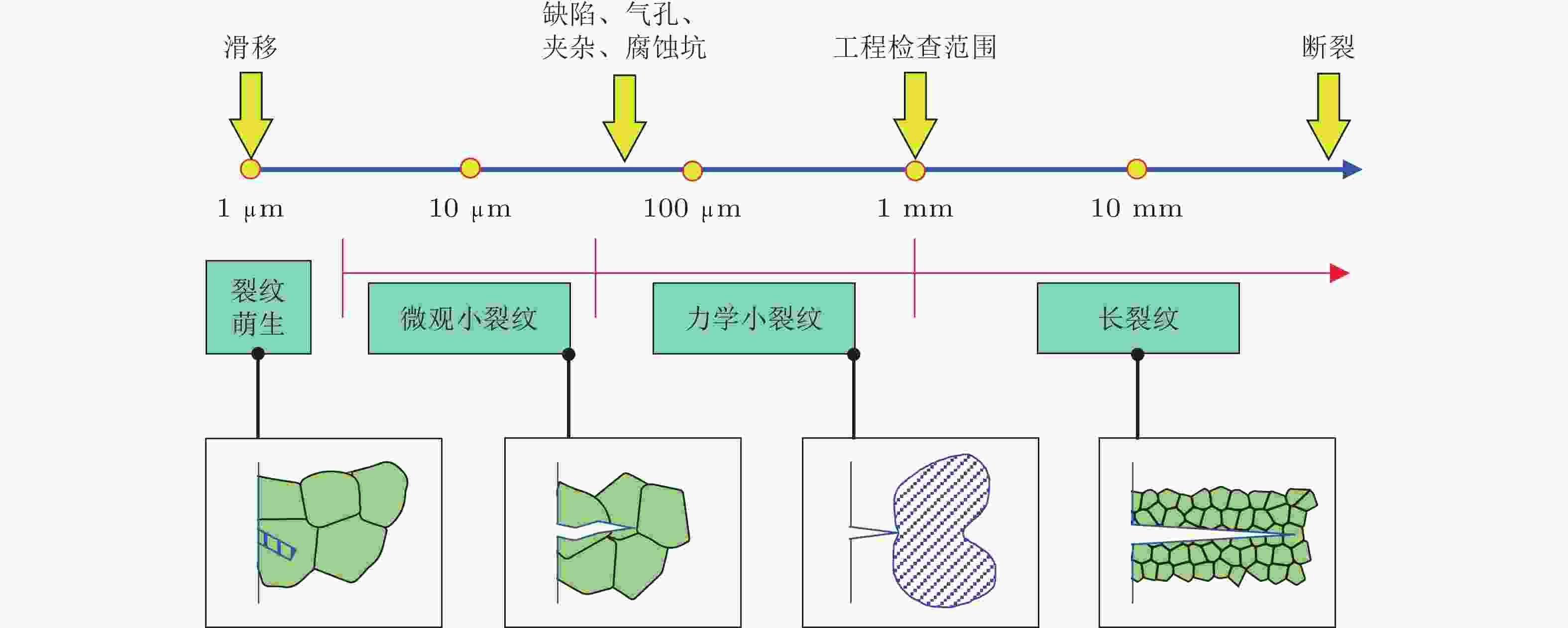
 下载:
下载:


